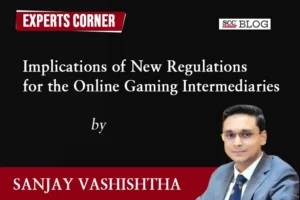The amendments to the Information Technology (Intermediary Guidelines and Digital Media Ethics Code) Rules, 2021 have been the subject of much discussion and controversy since their introduction. These amendments, which are intended to regulate the online gaming industry, have far-reaching implications for intermediaries, Self-regulatory Bodies (SRBs), and Online Gaming Operators. In this essay, we will examine the key changes introduced by the amendments and their implications.
In addition to the requirements for intermediaries, the gaming amendments also introduce new obligations for advertisers. The amendments require that advertisements for online real money games include a disclaimer indicating that users must be over 18 years old and that the game involves financial risk. The amendments also require advertisers to verify the registration of the Online Gaming Intermediary (OGI) offering the game and to ensure that the advertisement complies with the SRB’s guidelines.
These advertising related obligations are in line with recent trends towards increased regulation of online gambling and betting activities. For example, in August 2021, the Advertising Standards Council of India (ASCI) issued new guidelines for advertising of online gaming and fantasy sports, including requirements for responsible advertising, avoiding misleading claims, and ensuring age and identity verification of users. These guidelines were developed in response to concerns about the potential harms of online gaming and the need to protect vulnerable users, particularly children.
Implications of the amendments
The amendments to the Information Technology (Intermediary Guidelines and Digital Media Ethics Code) Rules, 20211 have significant implications for online gaming and gambling activities in India. Some of the key implications are discussed below:
-
Broader scope: The amendments have expanded the scope of the regulations to cover all online games, not just real money games. This means that companies offering free games will now be classified as OGIs and will be subject to certain obligations, such as know your customer (KYC) and user verification requirements. However, the focus of the amendments is on real money games, and the substantive obligations apply mainly to the operation of these games. There is a risk that courts, regulators, or intermediaries may seek to regulate free-to-play e-sports as real money games, which could have unintended consequences.
-
Lighter burden for SRBs: The amendments have simplified the compliance regime for SRBs, which are responsible for reviewing and registering online real money games. SRBs are now only required to publish a report on their website, detailing the list of games reviewed, the period of validity, the basis for approval, and details of any suspension or revocation. This provides clarity for intermediaries and users who can play these games.
-
Clearer obligations for OGIs: The amendments have introduced clearer obligations for OGIs, including KYC and user verification requirements, compliance with law enforcement requests and court orders, and compliance with SRB guidelines. Real money OGIs are subject to stricter compliance standards than major social media intermediaries. However, there is a risk that the definition of real money games may be too broad, which could lead to unintended consequences.
-
Advertising-related obligations of intermediaries: The amendments have introduced new obligations for intermediaries and advertisers, including due diligence obligations to ensure that online games do not cause harm to users, verification of registration of OGIs, and compliance with SRB guidelines. Advertisements for online real money games must include a disclaimer indicating that users must be over 18 years old and that the game involves financial risk. The focus on responsible advertising is in line with recent trends towards increased regulation of online gambling and betting activities.
Conclusion
The amendments to the Information Technology (Intermediary Guidelines and Digital Media Ethics Code) Rules, 2021 have significant implications for online gaming and gambling activities in India. While the amendments are intended to provide greater clarity and protection for users, there is a risk that the definitions of key terms such as “real money games” may be too broad, leading to unintended consequences. The focus on responsible advertising is a welcome development, but it remains to be seen how effective the new obligations will be in practice. Overall, the amendments represent an important step towards regulating online gaming and gambling in India, but there is still much work to be done to ensure that the regulations are effective and do not have unintended consequences.
† Advocate is a practicing counsel at the Supreme Court of India, LLM in Comparative Criminal Law from McGill University, Canada and MSc, Criminology and Criminal Justice from University of Oxford. He is serving as a counsel/special counsel and consultant for several law enforcement and public sector institutions.

